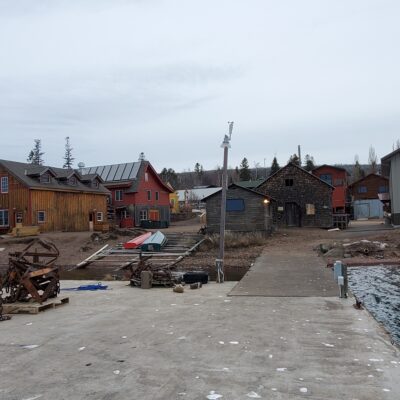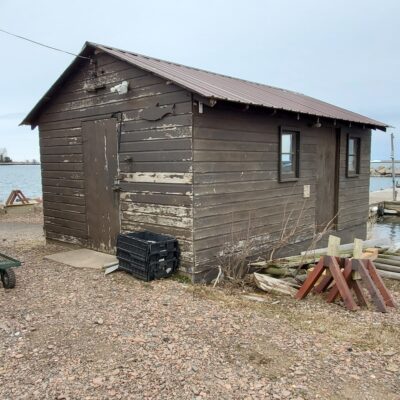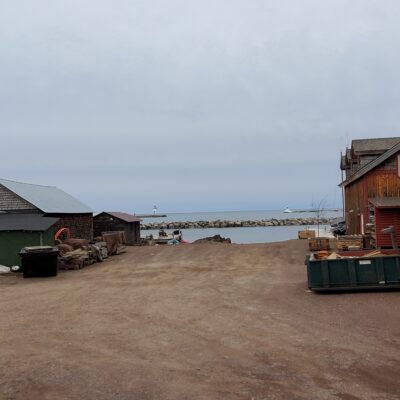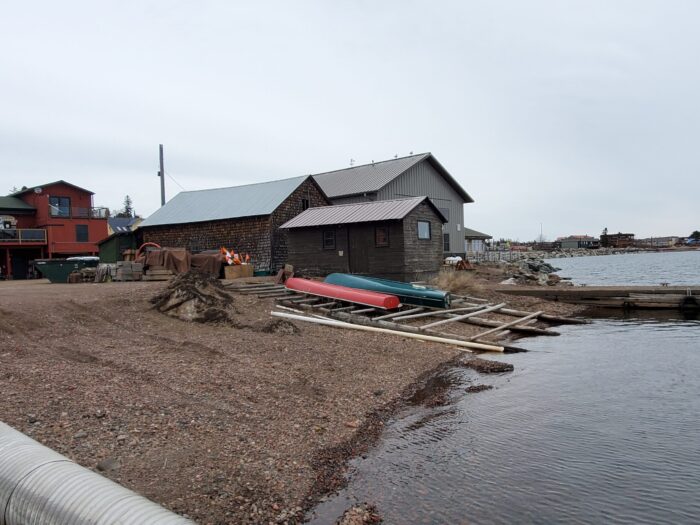North House Folk School shares more about process and planning for waterfront campus
North House Folk School has been the focus of several WTIP news stories of late as the folk school brought forward its plans for a new building on campus that would require a Lake Superior shoreline setback variance. That variance was denied by the Grand Marais Planning Commission on April 6. WTIP checked in with North House Folk School Director Greg Wright to learn more about the school’s plans for the future of the campus.
Wright said when North House purchased the Dockside Fish Market property five years ago, they were encouraged by the city to develop a plan for the property that addressed not just the programming needs of the school, but the needs of the other businesses that are really important to the community—Angry Trout, the Dockside Fish Market, and Fisherman’s Daughter, and North Superior Fisheries.
Wright explained to WTIP that the building was positioned in a way so that it could have solar panels and stormwater management initiatives. He reiterated what was said at the planning commission meeting about the wooden deck proposed for the waterfront, noting that it would make the waterfront more accessible, not less.
WTIP noted that although the planning commission decision was simply on whether or not to grant a shoreline setback variance, it is more complicated than that. Community emotions seem to be running high about several other matters. One is the historic Scott fish house.
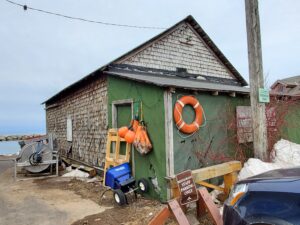
The back side of the historic Scott fish house on the Dockside property. North House Director Greg Wright assures the public that the historic structure will not be torn down.
If the variance had been granted, or even if there’s a different configuration for the building, it is likely that North House will move the fish house to another location. The Cook County Historical Society has made it known that their preference is to leave a historic building at its original location. But they said they will work with North House if the building is moved. The potential location under discussion is The Point near the Coast Guard Station. That relocation would need approval from the U.S. Forest Service, which actually owns the land at The Point.
WTIP noted that government moves slowly on such requests and asked Wright if he felt that could be worked out on North House’s timeline for a new building. Wright first confirmed that the Cook County Historical Society had been very clear with North House about their preference for leaving the fish house where it was. Wright said he appreciated the historical society’s “directness and transparency.”
Wright pointed out that in the case of a historic structure on private property, the landowner is in charge of the building. He stressed that North House has no plans to destroy the building. He said North House understands the importance of the fishing legacy of the community and the Scott fish house is part of that history. But, he said the school feels that history would be better served by relocating the structure to a site where it could be well cared for with appropriate interpretation.
Wright said the timeline for anything to happen to the old fish house is unknown, but that process is not directly related to the planning for a new classroom building.
Another concern raised by many community members is that the new building as proposed would crowd out the North Superior Fisheries operations. At the planning commission meeting, both Wright and North House Folk School Board Member Mike Prom said that retaining the fishing operation is very important to the school. However, at that meeting, Adrianna Brisson, speaking for North Superior Fisheries, expressed concern that a small fish house, where the commercial fishermen keep their gear will be relocated—but they have not been told the new location. She said the fishing company would like to see that building on the drawing of the proposed changes. She also expressed concern that there are no long-term guarantees that the fishermen will be able to work on the dock and in the Dockside Fish Market building. WTIP asked Wright if North House would provide more details and something in writing for the fisheries.
Wright again said, “You know, one of the things we heard loud and clear when we bought the Dockside property was, ‘Don’t you mess with my fishermen.’”
He said North House has worked to fulfill that history and legacy. He said the folk school and fishery are both there, working as partners in different businesses. He said the folk school has met with the fisherman a number of times over the years about their needs. He said the folk school’s architect sought their advice for the space they would need to get their forklift down to the dock to retrieve fish. He said there had been discussion of where the small fish house which stores fishing gear could be located, but noted that since the folk school doesn’t know yet where its building will be located, they haven’t made a decision on the smaller structure. He said having a place for the fishermen to store their nets and equipment is “absolutely” a goal.
Wright also responded to comments from the public that although North House says it welcomes the public and wants folks to walk through and enjoy the campus, there are people who don’t feel that it’s welcoming. There have been comments that pallets of wood for projects and boats seem to block the shoreline. One commenter said they feel that they are only allowed to visit the folk school Yellow building that houses the school gift shop.
Wright said the folk school felt that it was doing things to welcome the community, such as free craft demonstrations in the folk school commons area. He said for 12 weeks during the summer, the public is invited to come on campus to watch blacksmiths working or someone making a birch bark box or a timber frame being raised. He mentioned events that are open to the community such as the Wooden Boat Show, with free presentations and guest speakers. He said people are welcome to come down to the dock to observe the Hjordis and there are sailing camp weeks for local youths.
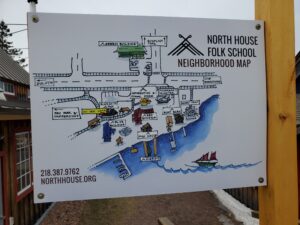
This sign gives a map of the North House campus when approaching from the timber frame bridge. Wright said additional signage welcoming visitors could be added.
However, after hearing from the public, Wright acknowledged that the folk school could do better. He said perhaps there could be clearer signage to let the community know the campus was open to walk through. “We could do simple things like making sure some of the utilitarian piles of timbers go to a more utilitarian space,” he said.
Regarding the denial of the variance, and North House’s subsequent withdrawal of its variance request entirely, WTIP asked Wright for his thoughts on what the planning commission had asked for–more proof that North House could only build this building the way they proposed. The planning commission suggested that North House consider downsizing or reshaping the building to better fit the property and encroach less on the shoreline setback. The planning commission also asked North House to demonstrate that the building fits the character of the neighborhood.
Wright said North House is not in a rush to return to the planning commission for a variance request. He said there is a rationale for the variance because North House lost a driveway in the Highway 61 reconstruction. Before that, Wright said, a semi could drive in one driveway and out the other. “We can’t do that anymore,” explained Wright. “And not only that, our local neighbor businesses can’t do that anymore.”
He said that is the driving factor behind the siting of the building to accommodate truck traffic to the school and businesses.
Regarding the proposed building fitting the character of the neighborhood, Wright said the school feels there are a number of ways that the plan for the building complements the existing condition of the waterfront. He said it seems to align with the city’s long-range planning of thriving local businesses. He said it also meets the goals of easier movement of community members and visitors on the harbor, preservation of local fishing, and the fishing culture.
A final question raised by some community members has been ‘Why doesn’t North House build something on the property it purchased across the road from the waterfront property?’ Wright explained that the purchase of the property was an “incredibly recent phenomenon” for the school. He said the folk school purchased the Dockside property five years ago and has been planning for the evolution of the parcel since then. He said the folk school will eventually have plans for the property purchased from Bruce Leng, but at this time there are too many unknowns.
Wright reiterated that North House wanted to hear from the community. “My goal is to be great at working together. I understand it doesn’t feel like that right now for some people. And, you know, I’m sorry about that.”
Wright said right now, North House is in “listening mode.”
Tom Morse, North House Folk School’s development director, has announced that the folk school will be gathering community feedback by hosting listening sessions and tours of the North House campus for the next three weeks, starting April 21. Each Tuesday at 9 a.m. and Thursday at 7 p.m., community members are invited to gather in the folk school’s green building.
Morse also said North House welcomes individual calls at any time at 218-387-9762.
Hear more from North House Director Greg Wright, speaking with WTIP’s Rhonda Silence below.

